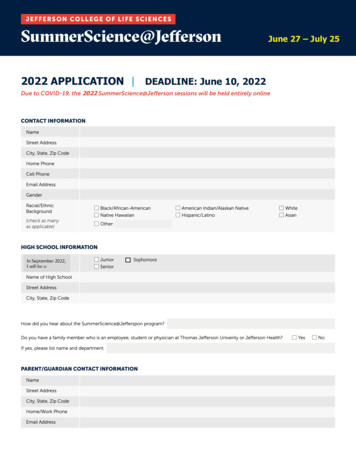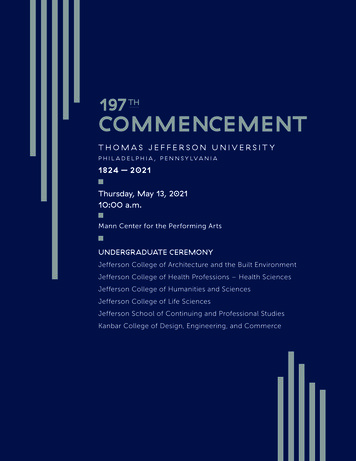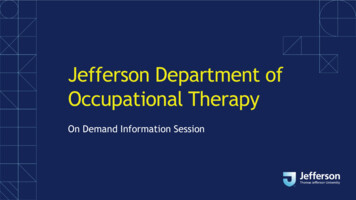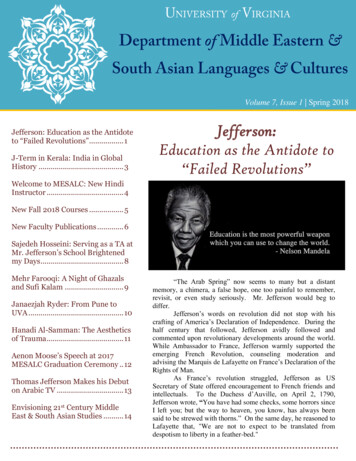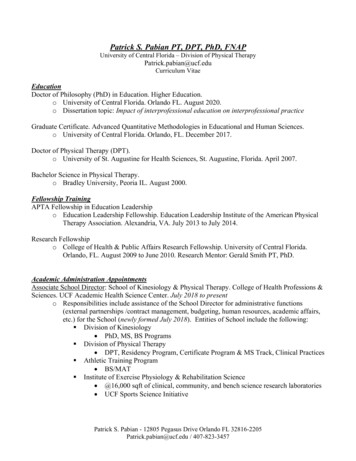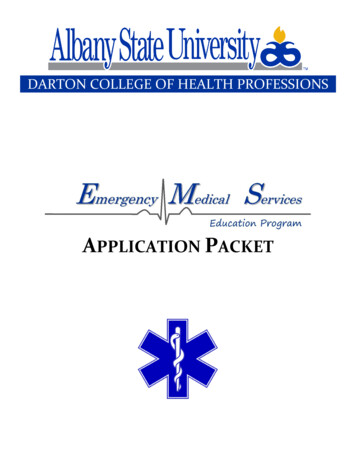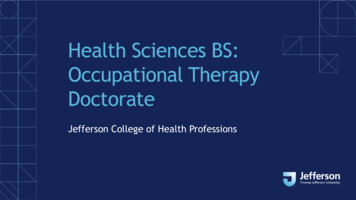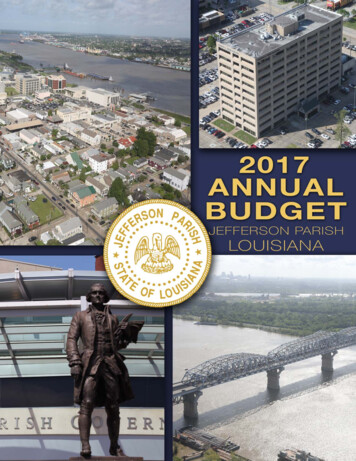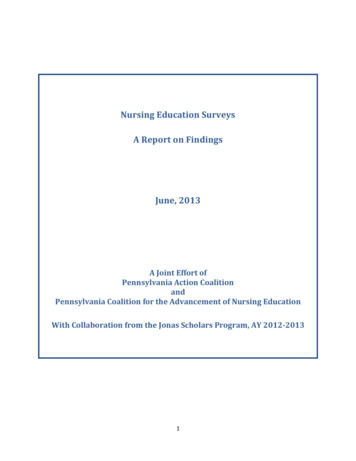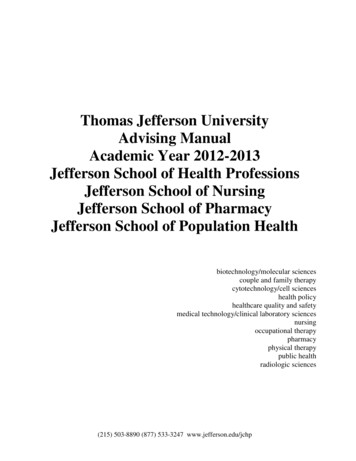
Transcription
Thomas Jefferson UniversityAdvising ManualAcademic Year 2012-2013Jefferson School of Health ProfessionsJefferson School of NursingJefferson School of PharmacyJefferson School of Population Healthbiotechnology/molecular sciencescouple and family therapycytotechnology/cell scienceshealth policyhealthcare quality and safetymedical technology/clinical laboratory sciencesnursingoccupational therapypharmacyphysical therapypublic healthradiologic sciences(215) 503-8890 (877) 533-3247 www.jefferson.edu/jchp
June 13, 2011Dear Colleague,We are pleased to provide our annual Jefferson Advising Manual. The information in this guide pertainsto the 2011-2012 academic year unless otherwise noted. We hope that this manual will serve as an easyto use educational reference for you as well as an important advising tool as you help your studentsnavigate their educational and professional goals.Jefferson continues to grow and improve. We have recently welcomed the founding chair of thePhysician Assistant Studies Program, Kathryn Beishline. The Master‘s in Physician Assistant Studiesprogram will enroll its first students in Fall 2014. More information about this program will be availableover the next year. Fall 2011 will be last term we enroll students in the ASN-BSN program at theGeisinger Campus in Danville, PA.We are excited about the changes taking place at Jefferson and expect that they will provide an evenmore diverse and vibrant environment in which our students can live and learn.As interest in careers in healthcare continues to expand, we encourage you to review our options forsecond-degree students. In addition to our Doctor of Physical Therapy degree, post-baccalaureatestudents can enroll in the Entry-level master‘s in Occupational Therapy, Master‘s in Couple & FamilyTherapy, one-year Advanced Placement Programs in the Radiologic Sciences, a 12-month acceleratedBSN through the FACT program, and a one-year Accelerated Professional Master‘s in Biotechnology,Cytotechnology and Medical Technology.We can‘t emphasize enough how much we value your role as a member of the Jefferson family and weappreciate your efforts in nurturing student interest in health-related careers. You are an integralcomponent of our partnership and we appreciate your expertise.Please feel free to call or email us with any questions you may have. We look forward to working withyou in the upcoming year.Sincerely,Jefferson Admissions StaffKaren Jacobs AstleDon SharplesNiki KelleySarah ReddonMark ChalmersTammi Wrice2Thomas Jefferson University
TABLE OF CONTENTS4679Jefferson Fact SheetAdmissions Contact ListCollege Partnerships & AffiliationsFrequently Asked QuestionsRadiologic SciencesRadiologic Sciences Information and Definitions13Radiologic Science ProgramsRadiologic Science Prerequisites1517Bioscience TechnologiesBioscience Technologies InformationBioscience Technologies Definitions18Bioscience Technologies ProgramsBioscience Technologies Prerequisites21Nursing InformationNursing ProgramsNursing PrerequisitesNurse Practitioner vs. Physician Assistant232022Nursing242627Occupational TherapyOccupational Therapy InformationOccupational Therapy ProgramsOccupational Therapy Articulation AgreementsOccupational Therapy Prerequisites28293032Physical TherapyPhysical Therapy InformationPhysical Therapy Programs and PrerequisitesPhysical Therapy Articulation AgreementsPhysical Therapy vs. Occupational Therapy3334353738Couple and Family TherapyPharmacyPharmacy InformationPharmacy Program PrerequisitesPharmacy Prerequisites394041The School of Population HealthPublic Health42Health Policy453Thomas Jefferson University
Jefferson Fact SheetMajors and DegreesJefferson is a career-oriented, associate, baccalaureate, master‘s, and doctoral degree institution thatoffers professional study mainly to students who have completed approximately two to three years ofprerequisite coursework elsewhere. JEFFERSON offers health professions degrees in the followingareas:Radiologic Sciences Bachelor of Science programs in cardiac sonography, computed tomography,general sonography, invasive cardiovascular technology, magnetic resonance imaging, medicaldosimetry, nuclear medicine, radiation therapy, radiography, and vascular sonography. Certificateprogram in PET/CT. Combined BS/MS degrees. Executive-style Master‘s of Science in Radiologic andImaging Sciences with tracks in education, management, ICVT and PET/CT.Bioscience Technologies Bachelor of Science, Entry-level Master‘s (combined BS/MS), AcceleratedProfessional Master‘s and Advanced Master of Science programs in biotechnology, cytotechnology andmedical technology. Post-baccalaureate certificate programs in blood banking, clinical chemistry,hematology, microbiology and molecular biologyCouple and Family Therapy Master‘s in Family TherapyNursing Prelicensure BSN, and Accelerated Pathway to the MSN for nurses and non-nurses, FACT,RN-BSN, RN-BSN/MSN, MSN (including Certified Registered Nurse Anesthetist) and Doctor ofNursing PracticeOccupational Therapy Combined BS/MS, Entry-level Masters, Doctor of Occupational Therapy,Certificates for Advanced PracticePharmacy Pharmacy DoctoratePhysical Therapy Doctor of Physical TherapyPublic Health Master of Public HealthChronic Care Management Certificate and Master‘sHealth Policy Master of Science in Health PolicyApplied Health Economics and Outcomes Research Certificate and Master‘sHealthcare Quality and Safety Master of Science in Healthcare Quality and SafetyPopulation Health Sciences – Ph.D.Tuition Fee Information - Academic Year 2011-12Complete tuition information can be found at: ncial AidMore than three-quarters of our students receive some form of financial assistance. For moreinformation contact The University Office of Financial Aid at (215) 955-2867 or online athttp://www.tju.edu/financialaid/4Thomas Jefferson University
HousingThe on-campus residential facilities are conveniently located within walking distance of Philadelphia‘sshopping, cultural and recreational activities and within two blocks of all campus facilities. On-campushousing is guaranteed to eligible first year students. Recently renovated Jefferson housing offers anaffordable opportunity for students to immerse themselves in the Jefferson experience. A variety ofshared and single accommodations are available both on and off campus. The Department of Housing &Residence Life can be reached at (215) 955-8913 or online at www.jefferson.edu/housing/Student LifeThe Office of Student Life for the students of the Jefferson Schools is responsible for student programs,academic support services, discipline and counseling. Some of the student programs they coordinate arethe new student Orientations, the Leadership LIVE program, and the annual Winter Social dinner anddance. The major responsibility of their office is to coordinate the delivery of services to students toassure successful student recruitment and retention. The Office of Student Life can be reached at (215)503-8189 or online at mStudent ActivitiesStudents can participate in the many clubs and organizations available including cultural, recreationaland social activities. Recreation facilities include a gymnasium, swimming pool, and physical fitnesscenter. Students are encouraged to make full use of these facilities, which are located in JeffersonAlumni Hall. The Activities Office can be reached at (215) 503-7743 or online atwww.jefferson.edu/activities/Career Development CenterThe Career Development Center offers counseling, workshops, resume assistance, and networkingopportunities for students and alumni. The CDC is also available for counseling and assistance asgraduates plan career transitions and growth. The Career Development Center can be reached at (215)503-5805 or online at www.jefferson.edu/jchp/studentlife/cdc.cfmCommuter ServicesThe Commuter Services Office offers discounted parking and public transportation passes for bothinside and outside of Philadelphia. Commuter Services can be reached at (215) 955-6417 or online athttp://www.jefferson.edu/cso/index.cfmOffice of International Affairs (OIES)Thomas Jefferson University welcomes people from all over the world to work, study, and engage inresearch and encourages Jeffersonian to study, lecture and do research abroad. OIES works with allUniversity departments to facilitate exchange and to offer orientation to international visitors. ESLclasses are also available OIES can be reached at 215-503-4335 or www.jefferson.edu/oies/.5Thomas Jefferson University
Admissions Office ContactsNameKaren JacobsAstleTitleAssistant VicePresident forAdmissionProgramsPopulation Health,PharmacyPhone(215) 503-1040EmailKaren.Jacobs@jefferson.eduDon SharplesDirector of GraduateAdmissionsPhysical Therapy,OccupationalTherapy, and CFTNiki M. KelleyAssociate Director ofAdmissions(215) 503-1041Niki.Kelley@jefferson.eduSarah ReddonAssistant Director ofAdmissions(215) 503-1045Sarah.Reddon@jefferson.eduMark ChalmersAssistant Director ofAdmissions(215) 503-1042Mark.Chalmers@jefferson.eduTammi WriceAssistant Director ofAdmissionsFACT, AcceleratedPathway to the MSN,MSNBioscienceTechnologies, CRNA,DNPPrelicensureBSN(includingPACE), all RNprogramsRadiologic Sciences(215)503-1043Tammi.Wrice@jefferson.eduDawn LarryOffice ManagerOffice Manager(215) fferson.edu(215) 503-1044Office of Admissions and Enrollment ManagementThomas Jefferson University130 South 9th Street, Suite 100Edison BuildingPhiladelphia, PA 19107(215) 503-8890(215) 503-7241 ply for admission online fm6Thomas Jefferson University
College Partnerships & AffiliationsJefferson is affiliated with a number of colleges, universities, and community colleges in an effort toincrease access to higher education in the nursing and health professions fields. These partnerships,including general agreements (2 2 and other degree completion programs), articulated curriculumagreements, and dual admission nursing programs provide students with a wide array of college choiceas they complete their prerequisite coursework.General AgreementsJefferson's general partnership agreements present a novel approach to degree completion and abaccalaureate (or higher) degree.2 2, 3 1, 3 2 PathwaysStudents enrolled in this program spend the first two or three years at an affiliated institutionbefore transferring to Jefferson to complete a nursing, occupational therapy, radiologic sciences,biotechnology, cytotechnology, or medical technology bachelor's and/or master's degree.Students who have already earned a bachelor's degree may also enroll in one of our one-yearPost-baccalaureate Pathways in radiologic sciences, biotechnology, cytotechnology, medical technology,or nursing. Due to the complexity of the Pharmacy admissions process, the admission guarantee doesnot apply to this program. However, we will work closely with our partner schools to facilitate thetransfer of students into the pharmacy program. Please contact us to discuss opportunities for pharmacyinformation sessions to be held on your campus.The General Agreement entitles students enrolled at our partner institutions admission to degreeprograms under the following conditions: All prerequisite coursework must be completed prior to enrollment at JeffersonA designated partner school representative must recommend the student for admissionStudents must have earned at least a 2.7 cumulative GPA to be considered foradmissionsStudents must have earned at least a 'C' in all prerequisite courseworkStudents may not have a criminal or disciplinary recordAdmission is extended as long as there are spaces available in the entering classWhere TOEFL is mandated, a minimum score of 87 (Internet-based) is requiredAccepted students must submit the results of a criminal background check and childabuse clearance prior to matriculationArticulated Curriculum Agreements (3 3 DPT and 3 2 OT)Jefferson's articulated curriculum agreements offer an innovative way for students to gainacceptance into upper division graduate programs while still in high school or during the freshman yearin college.Articulated curriculum agreements are available for the Doctor of Physical Therapy program,the Entry-level Master's in Occupational Therapy program, and the combined bachelor's/master's degreesin Biotechnology, Cytotechnology, and Medical Technology. More information on these programs canbe found at www.jefferson.edu/jchp/admissions/partners.cfm .Dual Admission Nursing ProgramsStudents currently enrolled in an associate of science in nursing program at one of our affiliateinstitutions can apply for admission to TJU‘s RN-BSN, RN-BSN/MSN or APW for RNs program for afuture term.7Thomas Jefferson University
Participating General Agreement (GA, Articulated Curriculum Agreement (ACA, and Dual Admission(DA)) Colleges, Universities, and Community CollegesArcadia University (GA)Atlantic Cape Community College (GA,DA)Bloomsburg University (GA)Bucks County Community College (GA)Burlington County Community College(GA,DA)Cabrini College (GA)Camden County College (GA)Camden County/Helene Fuld (ACA,DA)Chestnut Hill College (ACA)Community College of Philadelphia (GA,DA)Cumberland County College (GA)Delaware County Community College (GA, DA)Dixon School of Nursing (DA)Elizabethtown College (GA & ACA)Gloucester County College (GA,DA)Gordon College (GA)Gwynedd-Mercy College (GA)Harcum College (GA)Immaculata University (GA & ACA)Juniata College (GA) (ACA)Keystone College (GA)La Salle University (GA)Lebanon Valley College (GA)Luzerne Community College (DA)Manor College (GA)Mercer Community College (DA)Messiah College (ACA)Middlesex County College (GA)Montgomery County Comm. College (GA,DA)Moravian College (GA)Muhlenberg College (ACA)Penn State Abington (GA & ACA)Penn State Delaware County (GA)Rider University (GA)Roxborough School of Nursing (DA)Saint Joseph‘s University (GA & ACA)Shippensburg University (GA)Susquehanna University (GA)University of Delaware (ACA)University of the Sciences (GA)Valley Forge Military AcademyVillanova University (GA & ACA)8Thomas Jefferson University
Frequently Asked QuestionsWhat are the admissions requirements? Undergraduate admission requirements vary by program but the most successfulstudents have a minimum cumulative and science grade point average of 3.0. The PACE program is open to high school seniors only. While grade point average andSAT requirements vary by major, all candidates should have a minimum of a 3.0cumulative GPA, a score of a 1,100 on the SAT (Reading and Math sections only),strong background in science and math coursework, and it‘s recommended but notrequired to have shadow or volunteer experience in a healthcare setting Graduate admission requirements vary by program but most successful candidates havea minimum cumulative grade point average of 3.0 and competitive scores on the GRE orMAT tests, if applicable. Pharmacy applicants must have at least a 2.7 cumulative GPA and PCAT compositescores in the 50th percentile or higher.How should I submit my application?You apply online at www.jefferson.edu/jchp/admissions/online.cfm Online applicants pay only 25. Inaddition, Jefferson has implemented the Self-Managed Application process. All application materialsmust be submitted at the same time in one envelope. Instructions are on the web or in the paperapplication.Pharmacy applicants must apply for admission through PharmCAS at www.pharmcas.org . PhysicalTherapy applicants must apply through PTCAS at www.ptcas.org . Applications for the CombinedBS/MS and EMOT programs must apply through OTCAS at www.otcas.org. Applications for allnursing programs beginning with the Pre-fall 2012 term must go through NursingCAS atwww.nursingcas.org. Applications materials for these programs are submitted directly to PharmCAS,PTCAS, OTCAS and NursingCAS. A Jefferson supplemental application is also required.Where should I complete my prerequisites before enrolling at Jefferson?You may complete courses at any accredited two-or four-year college or university. While not required,you are encouraged to attend a college or university that has signed a transfer agreement with ThomasJefferson University. Our agreement institutions have designated an on-campus advisor who isknowledgeable about the prerequisite course requirements and familiar with our academic programs andfacilities.Do I have to complete all of my prerequisite courses before I apply?While you are required to have all prerequisite work completed prior to enrollment, you do not need tohave all prerequisite work completed at the time of application; however, the majority of your scienceand math coursework should be finalized. Should you have some coursework in progress at the time ofapplication, or if you plan to complete this work during the summer prior to enrollment, you shouldsimply indicate the missing coursework in the appropriate section of your application. The majority ofthe science and math prerequisite work should be completed at the time of application.9Thomas Jefferson University
Is there an application deadline?Admission to Jefferson is on a rolling basis and is divided into the Admissions Review Periods outlinedbelow. To be reviewed for a particular period, all application materials must be postmarked by theindicated date and should be submitted together in a single envelope. Preference is given to completeapplications that meet the postmark dates; however, we will accept applications as long as space isavailable. All students who meet the postmark date for the review period will have the same chance ofearning acceptance to their respective program regardless of whether the application was received at thebeginning or the end of the review period.You need not complete all prerequisites before you apply, but the majority of your science prerequisitecoursework should be completed before an admissions decision can be made. All prerequisites must becompleted before you enter the program. You may also earn credits through standardized tests,including CLEP. Admission is competitive, as there are a limited number of eats in each class.Complete Admissions Review Period Dates can be found at:http://www.jefferson.edu/population health/students/prospectve/review periods.cfmJefferson School of Population dlines.cfmJefferson School of Health ProfessionsJefferson School of NursingJefferson School of PharmacyJefferson School of PharmacyAdmission to the School is on a rolling basis and is available for the Fall semester. All applicationmaterials must be received by PharmCAS by March 1, 2012.Applicants are also required to complete a supplemental Jefferson application.The Jefferson Office of Admissions will send applicants an email with a link to the online applicationand a logon id after we have downloaded the pharmacy application from PharmCAS.Jefferson will send applicants a second email with a PIN to access the supplemental application. Notethat the supplemental application is not accessible from the public website and can only becompleted via the link referenced above.Applications will only be reviewed after the PharmCAS application, PCAT scores, letters ofrecommendation and Jefferson Supplemental Online Application are received.Jefferson School of Pharmacy will begin notifying applicants of admission decisions afterOctober 31, 2011.Is there a waiting list?Once a program is full, a waiting list is created in the event that someone chooses not to accepthis/her seat. The waiting list is dissolved once classes begin in September.10Thomas Jefferson University
What courses can be transferred to Jefferson?Those with a grade of ‗C‘ or higher that meet the program requirements (a ‗C-‗ is not acceptable).Developmental, physical education, and courses such as pottery, typing or photography are nottransferable. Science and math courses older than 10 years (5 years for pharmacy applicants) aretransferable if validated by a challenge or CLEP exam or if the applicant is working in a field wherescience and math concepts are used on a daily basis.Transfer credit is based on the number of credits the course is assigned at TJU. For example,calculus is a 3-credit course at TJU; therefore a student with a 4-credit calculus course at anotherinstitution would receive only 3 credits for that course at TJU.Is housing available?Students who are accepted to TJU by May 31st and who have a housing application on file byMay 31st are guaranteed on-campus housing. Thomas Jefferson University has three universityresident facilities: Martin Residence Hall, Barringer and Orlowitz Apartment Complexes.Is volunteer experience required?While not required of all programs, volunteer experience is strongly recommended as part of acompetitive application package. For department recommendations, contact the admissions office.How many students enroll through the PACE and 3 programs?Each year, approximately 10% of the student body is comprised of PACE students. Once accepted,you are guaranteed admission for your junior year at Jefferson as long as you successfully completeall prerequisite courses for your major, as well as maintain the required cumulative grade pointaverage.How many years do I spend at my first institution?While students are typically able to complete the prerequisites within two years, some choose toremain at their first institution for a third year.When do I apply for housing and financial aid?For PACE, 3 3 and 3 2 students, housing and financial aid applications will be sent to you the yearprior to matriculation into Jefferson. For transfer and graduate students, an aid application is sent toyou soon after you apply. Financial aid you received at your first institution is applicable only to thatinstitution. A separate package will be awarded by Thomas Jefferson University.Do you offer varsity sports?While there is no intercollegiate athletic program, Jefferson does offer a full complement ofintramural sports. For athletic enthusiasts, facilities include an indoor swimming pool, fullyequipped gymnasium and weight room, racquetball court, a physical fitness center, sauna and anaerobics room.Do you recommend that I have a car on campus?You may have a car on campus. However, because parking is costly and since mass transportation iseasily accessible, we recommend that you leave your car at home.11Thomas Jefferson University
If not admitted through PACE or a 3 program, may I reapply in the future?Yes. If you are not admitted through the PACE program you may reapply as a transfer student.What contact will I have with Jefferson while attending my first school?You will receive a series of mailings and phone contacts from the Jefferson community whileattending your first institution. In addition, we will invite you to Jefferson to meet your futureclassmates and familiarize yourself with the campus at our annual Welcome Picnic and AdvisingDay events.Will I need a Criminal Background Check and Child Abuse Clearance?Yes. All accepted students must complete both a Criminal Background Check and Child AbuseClearance prior to matriculation. Specific instructions will be provided to each accepted student.Individuals who have been convicted of a felony or misdemeanor may be denied certification orlicensure as a health professional. Information regarding individual eligibility may be obtained fromthe appropriate credentialing bodies. Clinical rotation and fieldwork sites may require a criminalbackground check and/or child abuse check in order to permit participation in the clinical experience,rotation or fieldwork. Participation in clinical experiences, rotations or fieldwork is a required part ofthe curriculum and a requirement for graduation. Clinical rotation and fieldwork sites may deny astudent's participation in the clinical experience, rotation or fieldwork because of a felony ormisdemeanor conviction, failure of a required drug test, or inability to produce an appropriate healthclearance, which would result in delayed graduation or in the inability to graduate from the program.Nursing students are also required to complete an additional FBI fingerprinting background checkand Drug Testing. Background checks and child abuse clearances are not required Masters inRadiologic Sciences, Doctor of Occupational Therapy, and General Studies students. Pharmacystudents may have additional background check requirements.12Thomas Jefferson University
Radiologic SciencesInformation & DefinitionsWhat is Radiologic Sciences?Radiologic Sciences is a field of medical study that uses pictures or images of internal organsand structures to prevent and diagnose disease as well as using therapeutic interventions to treat disease.These images are captured in a number of ways, usually viewed on a computer screen, and theninterpreted by a physician.What are the different modalities?Radiography uses x-ray beams to create films of body features when examining patients forbroken bones, ulcers, tumors, and/or the disease of various organs. A technologist uses x-ray equipmentto produce radiographs or films of the appropriate density, detail and contrast.A specialization of radiography, known as Computed Tomography (CT), also uses x-ray beams.In this case, the beams create cross-sectional images of the body, which are then assembled into threedimensional images by a computer and produced on a computer screen to be evaluated.While both of these modalities use radiation for image production, another specialization, calledMagnetic Resonance Imaging (MRI), creates cross-sectional images by using radio waves and magneticfields. Hydrogen atoms in the body react to the magnetic fields to help create these three-dimensionalimages and produce them on the computer screen for an MRI technologist and physician to evaluate.General Sonography or Ultrasound uses high-frequency sound waves to create images ofinternal structures of the body. The image is created by the echoes from the sound waves collected onequipment run by a sonographer. The sonographer performs a diagnostic scan and makes a permanentrecord of the data obtained for interpretation by a physician. By viewing the screen as the scan takesplace, sonographers look for subtle differences between healthy and pathological areas to decide whichimages are passed on to the physician and which images are satisfactory for diagnostic purposes.The four modalities above assess the structure of an organ. A fifth modality, Nuclear MedicineTechnology, was developed to take these processes one step further and assess the function, as well asthe structure, of the organ. With traces of radioactive materials, known as radiopharmaceuticals, injectedinto the body, an image is detected by a gamma camera and produced on a computer screen. This imagenot only illustrates the anatomy and image of the organ, but also demonstrates how well the organ isfunctioning within the body.Cardiac Sonography, or ultrasound of the heart, allows a technologist to measure the size of theheart chambers and study the valves to determine the efficiency of blood flow through each chamber andto the rest of the body. Cardiac sonography uses high-frequency sound waves to produce a real-timeview of all the chambers of the heart, the heart valves, the heart muscle, and the great blood vesselsentering and leaving the heart. A cardiac sonographer is a highly skilled professional instrumental in theevaluation of congenital and acquired cardiac abnormalities and associated complications.Vascular Sonography uses ultrasound to examine blood flow through the vascular system, orarteries and veins. The images produced are used to detect abnormalities and vascular disease.Invasive Cardiovascular Technology is a procedure that helps technologists assess the pumpingaction of the heart and valves and blood flow. By threading a catheter, or thin tube, from a vein or arteryin the leg to the heart, a dye is injected into the chambers and vessels, and an image is produced for thephysician to interpret.Radiation Therapy involves treating diseases with penetrating beams of high-energy radiation.Radiation Therapists are highly skilled members of the cancer management team. They are responsiblefor recording, interpreting and administering the treatment prescribed by radiation oncologists.Medical Dosimetry is a sub-specialty of radiation oncology that deals with treatment planning,dose measurement, dose calculations and quality assurance of radiotherapy treatment designed to treatcancer. Medical Dosimetrists plan and calculate ionizing radiation under the direction of a medicalphysicist.13Thomas Jefferson University
Positron Emission Tomography and Computed Tomography (PET/CT) are standard imagingtools that allow clinicians to pinpoint the location of cancer within the body before making treatmentrecommendations. The highly sensitive PET scan picks up the metabolic signal of actively growingcancer cells in the body, and the CT scan provides a detailed picture of the internal anatomy that revealsthe size and shape of abnormal cancerous growths. Alone, each test has its limitations but when theresults of the scans are fused together they provide the most complete information on cancer andmetabolism. In the past, difficulties have arisen from trying to interpret the results of both tests togetherbecause patients often change their positions between tests. The combined PET/CT scan allowsclinicians to perform the tests simultaneously; which leaves less room for error in interpreting testresults.Where do radiologic sciences professionals work?Radiologic science professionals work in the following settings: hospitals, medical centers,academic health centers, coll
College Partnerships & Affiliations Jefferson is affiliated with a number of colleges, universities, and community colleges in an effort to increase access to higher education in the nursing and health professions fields. These partnerships, including general agreements (2 2 and other degree completion programs), articulated curriculum
